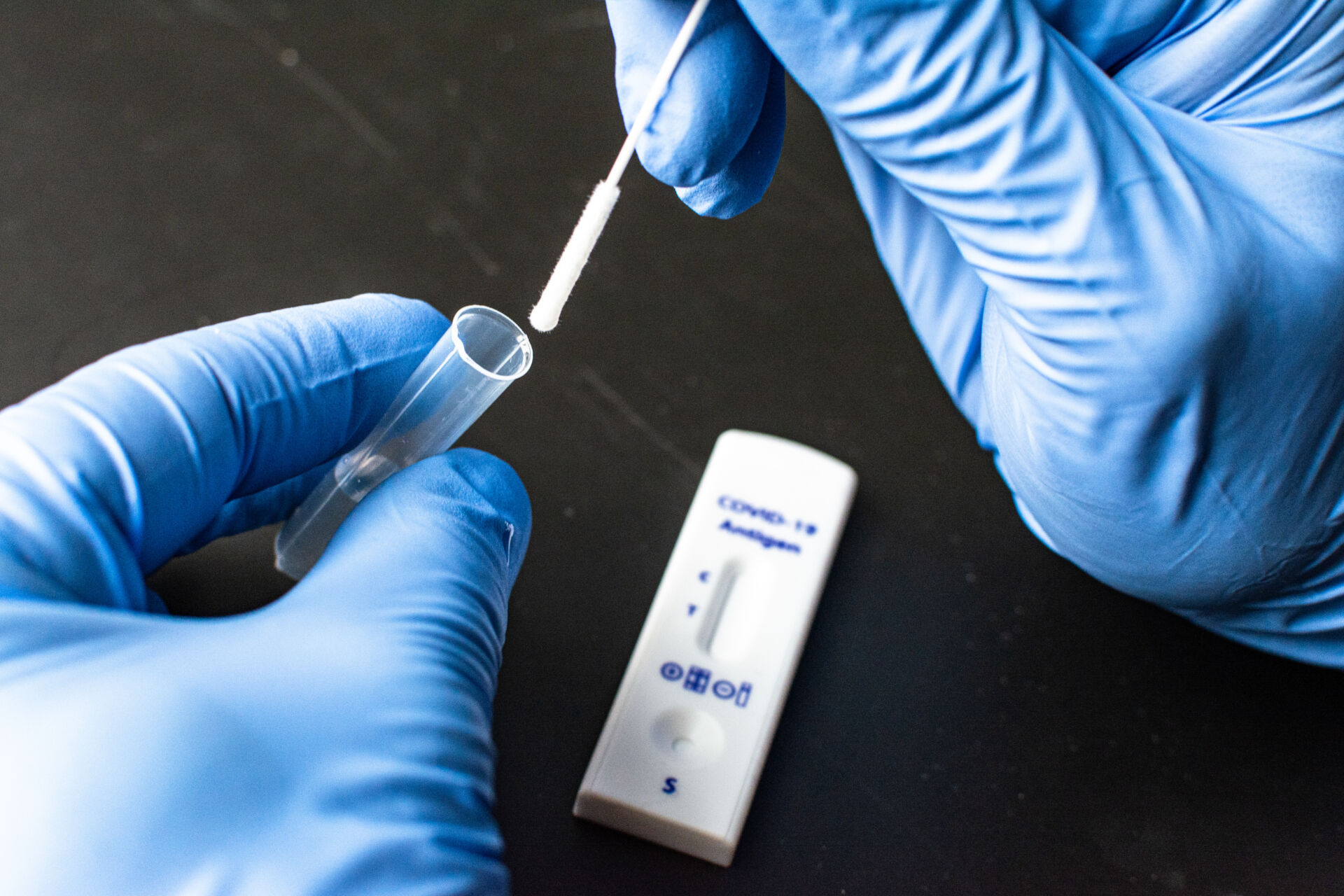Point of Care Testing Performed by Pharmacy Technicians

Point-of-care testing (POCT) is diagnostic testing performed by a healthcare professional, generally near to, or at the site of patient care. POCT results are used to identify a disease or chronic condition and monitor a patient’s treatment. POCT can provide rapid results and the opportunity for more timely intervention. In recent years, the types of available point of care tests and the number of tests being performed in pharmacies has grown.
Pharmacies can use point of care testing to monitor glucose levels and cholesterol, screen for A1c and sexually transmitted infections like HIV and chlamydia and even monitor anticoagulant therapies. POCT can also be used to diagnose acute infections such as strep pharyngitis and COVID-19.
Standards and Guidelines
In 2019, the Alberta College of Pharmacy introduced standards and guidelines for laboratory and point-of-care testing. These documents provide support to pharmacy technicians and pharmacists for determining how to conduct point of care testing. The pharmacist must determine that a POCT is appropriate for a patient by clinically assessing the purpose for the test and their health history. A pharmacy technician may conduct a POCT once they are satisfied that the pharmacist’s assessment has been completed. If a pharmacy technician will perform POCT in a licensed pharmacy, they must also ensure that there is a POCT program in place that includes standard operating procedures and a list of each type of POCT that may be conducted in the pharmacy. The pharmacy licensee must also ensure that pharmacy technicians and pharmacists who conduct tests are trained and competent.
Using the ACP Pharmacy Policies and Procedures Manual template, PTSA has created a sample of standard operating procedures (SOPs) that should be added to the pharmacy’s current SOPs when introducing pharmacy technician-conducted POCT. PTSA members can access this document through the Member’s Only Resources section of the website.
Training
Most POCT are simple to use, but results are only as good as the specimens that are tested. This is why procedures must be followed and training is required. A pharmacy technician must only conduct a POCT in accordance with their personal knowledge, skills and competencies. In addition to knowing how to conduct each test, the pharmacy technician must ensure their competence is current in infection prevention and control practices, including how to use PPE properly. Pharmacy technicians may want to refer to the Health Canada report on Routine Practices and Additional Precautions for Preventing the Transmission of Infection in Healthcare Settings – Canada.ca
There is not one single continuing education program that a pharmacy technician may need to complete in order to prepare for conducting POCT. I recently enrolled in the Point-of-Care Testing for Pharmacy Technicians program provided by the American Society of Health-System Pharmacists. While designed for a U.S. audience, I found the program to be a good high level overview of POCT. Specific training for each POCT type to be conducted will also be needed and is often guided by manufacturer specific testing protocols.
Scope of Practice
A pharmacy technician may also only conduct a POCT in accordance with their scope of practice. Some of the common methods used to collect specimens for a POCT include finger sticks, throat swabs and nasal swabs. In Alberta, to cut a body tissue below the dermis is a restricted activity that pharmacy technicians are not authorized to perform. Performing throat and nasal swabs (different from nasopharyngeal swabs) are not restricted activities and may be performed by pharmacy technicians.
As a result of the changing COVID-19 situation in Alberta, pharmacists and pharmacy technicians may conduct asymptomatic screening for COVID-19 using rapid antigen testing. The specimens for these tests are collected using a nasal swab.
While some provinces address the performance of POCT by unregulated pharmacy assistants, the Alberta standards and guidance are silent on this issue. A pharmacy professional must only conduct a POCT on a patient with whom they have a professional relationship. Pharmacy professionals must also use their judgement to determine if the requirements of a POCT program have been met. Since these tasks are more appropriately performed by pharmacy technicians and pharmacists, pharmacy assistants would not be permitted to conduct POCT. Pharmacy assistants may support the clerical management of programs including patient scheduling.
Are you conducting POCT in your practice? Do you have suggestions for training resources that pharmacy technicians can use to expand their knowledge in this area? Share your comments below.
About the author: Since receiving her pharmacy technician diploma in 1998, Teresa Hennessey has practiced in front-line and leadership roles in both community and hospital pharmacies. Teresa is dedicated to helping pharmacy technician practice evolve and will share her ideas and opinions on this topic with whomever will listen.

4 replies on “Point of Care Testing Performed by Pharmacy Technicians”
Does anyone have experience doing clinic days? I would like to do blood glucose and pressures to free up the pharmacists. Any thoughts?
Hi Kathleen. Not recent experience but I’ve done clinics when I practiced in community pharmacy. Something to keep in mind is that pharmacy technicians can’t collect a blood sample from a patient for testing blood glucose. At the diabetes clinics I hosted (again many years ago) I provided other services related to meter training and often used a nurse for the actual testing. A pharmacist was also available. Checking blood pressure is most definitely appropriate for a technician to do.
Currently myself and my other technician conduct the covid rapid testing for patients needing to travel.
Our pharmacy is located in a clinic with multiple family practice physicians as well as a walk in clinic.
I would love to collaborate with the physicians and see if there is a way we could initiate POCT in regard to Strep, HIV, etc to streamline treatment.
Has anyone else experienced this as part of their workflow?
What other testing have you done?
Hi Britney. There will a presentation at this year’s conference by Kimberly McKay, RPhT that may help answer your questions. More information and how to register should be available soon.